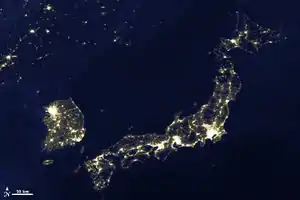Pollution
Pollution is the introduction of anything that causes disorder to an ecosystem. There are several different kinds of pollution, detailed below. It is generally considered to be a bad thing, though some people are in denial about this.
| —Ronald Reagan, 1981 "Look, Mr President: killer trees!" - James Brady, 1982 |
“”"I love that smell of the emissions!" |
| —Sarah Palin, 2011[1] |
| a buncha tree-huggers Environmentalism |
 |
| Save the rainforests! |
| Watch that carbon footprint! |
|
v - t - e |
Noise pollution
Noise pollution mostly consists of Rock and Roll construction sound and transportation sound, such as airplanes, automobiles, and trains. It has a variety of negative effects including high blood pressure[2] as well as lost sleep and psychological problems.[3] In addition, noise from military sonar is believed to be one of reasons whales beach themselves.[4] For an added bonus, animals are driven out of their habitats by the noise.
Governments up until the 1970s viewed noise as a "nuisance" rather than an environmental problem. In the United States, there are federal standards for highway and aircraft noise; states and local governments typically have very specific statutes on building codes, urban planning and roadway development. In Canada and the EU, there are few national, provincial, or state laws that protect against noise. The notable exception: Portland, Oregon where you can be fined up to $5000 dollars.
Light pollution

Light pollution is any adverse effect of artificial light including sky glow, glare, light trespass, light clutter, decreased visibility at night, and energy waste.[5] It generally makes Earth-bound astronomy difficult, if not impossible. Other serious effects include an adverse effect on human psychology.[6] Earth hour if done at night would reduce light pollution. So please, for our sanity, keep the Christmas lights off.
Radioactive waste
Radioactive waste is defined as radiological contamination, is radioactive substances on surfaces, or within solids, liquids or gases (including the you), where their presence is unintended or undesirable, or the process giving rise to their presence in such places.[7] This is a bad thing.[note 1]
Nowadays radioactive waste is never released into the environment in significant quantities, unless a severe accident happens. Therefore, unlike other types of pollution discussed on this page, the concern is not about the current adverse effects of radioactive waste, but rather the potential impact of its accidental release.
Air pollution
Air pollution is the release of such delightful things as Chlorofluorocarbons, Carbon dioxide, Carbon monoxide, lead, and Nitrous oxide, among others. These typically contribute to the hole in the ozone layer, acid rain, and the Greenhouse effect. It also slowly kills people when they breathe it in. Air pollution is regulated in the US by the Clean Air Act,and in the EU by Directive 2008/50/EC.
There is also air pollution that is biological in nature, called bioaerosols, found most often near compost heaps, farms, saw mills and other areas where organic material is handled. They cause various intestinal and respiratory problems like farmer's lung to people who breathe in organic dust.
High levels of outdoor air pollution causes cancer in humans.[8]
Water pollution
Water pollution is, you guessed it, things like sewage, fertilizer, and industrial waste getting into water. Oil spills are an example of water pollution on a large scale. This has an adverse effect, not just on your drinking water but also on your seafood. [9]
Soil contamination
Like air pollution and water pollution, but the chemicals are in the soil. Thus they get into the food you eat, yes, even you vegetarians, although due to bioaccumulation, the meat-eaters will have it worse (for most pollutants). This often overlaps with water pollution, as runoff from soil contamination causes water pollution.
External links
Notes
- You will not become Spiderman or the Hulk.
References
- Quoted in Klein, Naomi. 2014. This Changes Everything P. 1.
- The BBC, Road noise link to blood pressure
- The Ocean Mammal Institute
- According to the International Dark Sky association
- Cambridge Handbook of Psychology, Health and Medicine, edited by Andrew Baum, Robert West, John Weinman, Stanton Newman, Chris McManus, Cambridge University Press (1997) ISBN 0-521-43686-9
- The Atomic Energy Agency
- Outdoor Air Pollution IARC Monograph Volume 109 (2016) International Agency for Research on Cancer.
- Like mercury for example